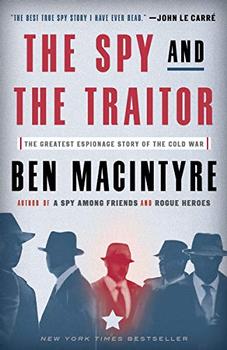Summary | Excerpt | Reviews | Beyond the Book | Readalikes | Genres & Themes | Author Bio

The Greatest Espionage Story of the Cold War
by Ben Macintyre
At the age of nineteen, Gordievsky took up cross-country running. Something about the solitary nature of the sport appealed to him, the rhythm of intense exertion over a long period, in private competition with himself, testing his own limits. Oleg could be gregarious, attractive to women, and flirtatious. His looks were bluntly handsome, with hair swept back from his forehead and open, rather soft features. In repose, his expression seemed stern, but when his eyes flashed with dark humor, his face lit up. In company he was often convivial and comradely, but there was something hard and hidden inside. He was not lonely, or a loner, but he was comfortable in his own company. He seldom revealed his feelings. Typically hungry for self-improvement, Oleg believed that cross-country running was "character building." For hours he would run, through Moscow's streets and parks, alone with his thoughts.
One of the few students he grew close to was Stanislaw Kaplan, a fellow runner on the university track team. "Standa" Kaplan was Czechoslovakian, and had already obtained a degree from Charles University in Prague by the time he arrived at the institute as one of several hundred gifted students from the Soviet bloc. Like others from countries only recently subjugated to Communism, Kaplan's "individuality had not been stifled," Gordievsky wrote, years later. A year older, he was studying to be a military translator. The two young men found they shared compatible ambitions and similar ideas. "He was liberal-minded and held strongly sceptical views about communism," wrote Gordievsky, who found Kaplan's forthright opinions exciting, and slightly alarming. With his dark good looks, Standa was a magnet to women. The two students became firm friends, running together, chasing girls, and eating in a Czech restaurant off Gorky Park.
An equally important influence was his idolized older brother, Vasili, who was now training to become an "illegal," one of the Soviet Union's vast global army of deep undercover agents.
The KGB ran two distinct species of spy in foreign countries. The first worked under formal cover, as a member of the Soviet diplomatic or consular staff, a cultural or military attaché, accredited journalist or trade representative. Diplomatic protection meant that these "legal" spies could not be prosecuted for espionage if their activities were uncovered, but only declared persona non grata, and expelled from the country. By contrast, an "illegal" spy (nelegal, in Russian) had no official status, usually traveled under a false name with fake papers, and simply blended invisibly into whatever country he or she was posted to. (In the West such spies are known as NOCs, standing for Non-Official Cover.) The KGB planted illegals all over the world, who posed as ordinary citizens, submerged and subversive. Like legal spies, they gathered information, recruited agents, and conducted various forms of espionage. Sometimes, as "sleepers," they might remain hidden for long periods before being activated. These were also potential fifth columnists, poised to go into battle should war erupt between East and West. Illegals operated beneath the official radar and therefore could not be financed in ways that might be traced or communicate through secure diplomatic channels. But unlike spies accredited to an embassy, they left few traces for counterintelligence investigators to follow.
Excerpted from The Spy and the Traitor by Ben Macintyre. Copyright © 2018 by Ben Macintyre. All rights reserved. No part of this excerpt may be reproduced or reprinted without permission in writing from the publisher.
Your guide toexceptional books
BookBrowse seeks out and recommends the best in contemporary fiction and nonfiction—books that not only engage and entertain but also deepen our understanding of ourselves and the world around us.